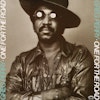Although enlightened music fans the world over were saddened by the passing of organist Lyman Woodard, the relationship that Wax Poetics had formed with the gifted musician and composer made the news especially hard to swallow. While orchestrating the comprehensive rerelease of the Lyman Woodard Organization’s magnum opus, Saturday Night Special, we had grown close to not only Lyman, but to Organization members Ron English and Leonard King, plus a host of others whose artistic efforts helped bring this legendary record to life. With each exchange, Lyman’s corner of Detroit, past and present, became part of our own world; with each conversation, more of Michigan’s fascinating musical history unfurled before us. Although Lyman had been harboring a notorious cough since the ’80s, his declining health made us especially nervous after a fall resulted in seven broken ribs. Although Saturday Night Special’s release date was on the horizon, many of us feared Lyman would not be with us to celebrate. A month shy of Saturday Night Special’s rebirth, Lyman Woodard passed away at the age of sixty-six.
Lyman displayed a propensity towards music early in life, taking instruction with the organist of the Congregational Church in his hometown of Owosso, Michigan. By high school, Lyman’s rampant fascination with R&B music had manifested itself in his playing, which he did in increasing capacity, gigging in nearby Flint. “He was known all over as the kid who could play all the Little Richard piano solos note for note—even the mistakes!” reflected poet/activist John Sinclair, who penned the liner notes to Saturday Night Special ’s 1975 release. Although the piano was Lyman’s first love, he soon fell for the Hammond B-3 after Jimmy Smith’s virtuosic playing caused the impressionable player to swerve across several lanes of traffic to keep Smith’s sweet serenade within his radio’s reception. “I kind of liken the experience to St. Paul being blinded by the truth of Christ,” Woodard later remarked.
Woodard’s versatility afforded him limitless opportunities in and around Motown, gaining him access to nearly every dimension of Detroit’s intricate music scene. Between raucous residencies at Detroit’s fabled Frolic Show Bar and J.J.’s Lounge, Woodard would work as bandleader for such marquee attractions as Martha Reeves and the Vandellas as well as Holland-Dozier-Holland darlings, the 8th Day. Lyman was loved by Black and White factions alike, creating an identity that, like his revered Charles Mingus, lacked a distinct racial stamp. “Lyman never told me he was White until 1996,” states Saturday Night Special drummer Leonard King. Having played off and on with Woodard throughout his career, King duly notes that, beyond race, Woodard’s audience transcended societal and generational boundaries as well.
“When we used to play at Cobb’s Corner,” King says, “I’d look out into the audience, and there’d be people wearing full-length minks sitting next to young people in cutoff jeans. There’s something about his music that’s just regenerative. And Lyman didn’t feel that what he was playing was jazz or blues or rock. He and I shared a similar attitude toward music—that as many colors as we can possibly use to execute this music to the fullest extent, that’s what we went for.”
Per Lyman’s request, King organized a tribute concert to honor Woodard and acknowledge the lasting impression he has made on both Detroit and on his peer performers. “If there’s anything I got from him directly,” King continues, “it is just to speak honestly; don’t tell any lies through the music. He was a beautiful human being and an honest person, and I believe his music speaks of that.”


